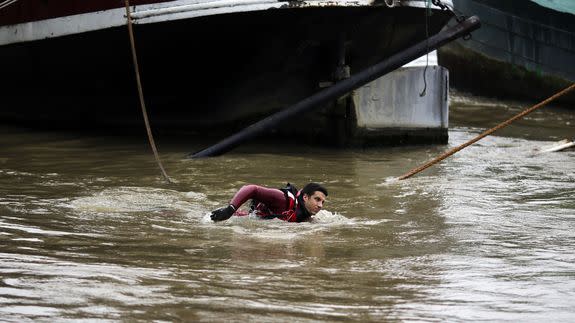The flooding in Paris is so severe, people are swimming down streets

Water continues to rise in Paris, where the River Seine has swollen so much that people are swimming through city streets.
The river is expected to reach a height of more than 21 feet high on Friday as floodwater continues to wreak havoc on the city and other parts of Western Europe.
SEE ALSO: Stubborn storm system floods parts of France after causing major damage in Germany
At least 15 people have died amid the flooding — 10 people in Germany, two in France, two in Romania, and one person in Belgium.
Around 5,000 people have been forced to evacuate their homes in France, and more than 21,000 homes have lost power.
Some of those who have decided to stay, have found alternate methods of transportation:
The Musée d'Orsay and The Louvre — both museums along the banks of The Seine — closed their doors to the public on Friday so staffers could move artwork out of the way of potential water damage.
Metro lines, too, have been disrupted by the floodwater.
The French Environment Ministry has said more evacuations may take place in towns outside of Paris that sit along the river.
The heavy rains are the result of a slow-moving low pressure system that has kept igniting powerful thunderstorms day-after-day.
The recent rains have come on top of an unusually wet May. According to Meteo France, in Ile-de-France, this May was the wettest on record, with rainfall totals coming close to the record high for any month, which was set in December 1999.
The agency said that three months of rain fell between May 29 to 31 across parts of the country.
Climate studies show that globally and throughout Europe, heavy precipitation events have become more common as a result of human-caused global warming. This, combined with increased development in flood plains, can worsen flood events.
In Europe, record-breaking rains increased 31% during the 1980 to 2010 period when compared to the previous 80 years, according to a study published in 2015.
Andrew Freedman contributed reporting.
